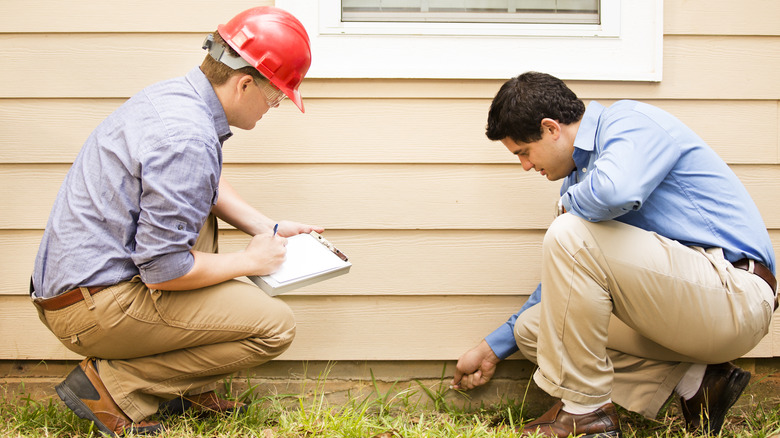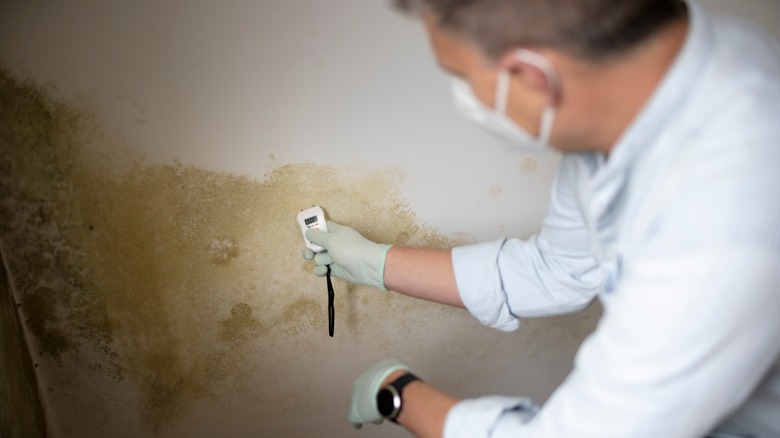The Stars Of Bargain Block Share Warning Signs To Look Out For When Buying A House
Buying a home is a major accomplishment, but navigating an unpredictable real estate market as an inexperienced buyer can make the milestone feel distant, if not completely unattainable. The home buying process is a long and tedious one and is designed as such to ensure all parties involved — from the seller to the buyer — will walk away feeling as if they've benefited from the transaction. Closing procedures are especially advantageous for the buyer, as it gives them a chance to inspect the house for infestations and damages before the sale becomes final. According to Keith Bynum and Evan Thomas of the HGTV's hit property renovation show "Bargain Block," prospective buyers should inspect all elements of a home's structure before closing on a deal in order to avoid expensive construction issues following their purchase. Two big issues they say to look out for? Foundational damage and misrepresented listings.
Underlying issues inside a property of interest are usually spotted during the recommended property inspection toward the end of the buying process, if not already identified by the seller or the selling agent during the initial tour. However, some agents may attempt to hide or understate the extent of a home's need for repairs from potential buyers in order to quicken the pace of the sale, an example of malpractice that may allow legal action from the buyer after the transaction.
Foundational damage
An important detail buyers should inspect when closing on a house is the condition of the home's foundation. As the literal base of the purchased home, the foundation is an integral aspect of a house's design, the state of which directly impacts the condition of the rest of the home. The stars of "Bargain Block" state that damage to a property's foundation, no matter the cause, may serve as a dealbreaker for an interested buyer since costs to fix it may exceed the budget available to purchase the house in the first place. "Anything that's a major foundation issue would be something to steer clear of," Evan Thomas told Realtor. "Those things can cost a lot of money."
These issues can be extremely difficult to detect and even more painful for homeowners to afford. Foundation repair costs can range anywhere from $250 to $800 for minor cracks, and they can rise even higher to fix a foundation that has been leaking or sinking over time. In worst cases, homes that call for a new foundation entirely can cost owners up to $100,000 to implement. Undergoing a proper inspection of the house with a professional is highly recommended for new buyers but isn't contractually required by lenders. While this procedure normally serves as an added cost on behalf of the buyer during the closing process, it can save buyers a lot of time, money, and stress even years into homeownership.
Misinterpreted property listings
Destruction of a home not only impacts foundations. Examples of structural damage caused by water, fire, or other natural or manmade disasters can be evident throughout the home, some more obvious than others. Unfortunately, signs of physical damage present throughout a listed home may also motivate real estate agents to act unethically on the job, displaying misleading information on the property's listing in order to attract interested buyers and help the sale progress faster. Keith Bynum told Realtor that a misrepresented recording of a listing's square footage once deterred them from purchasing a property for renovation. That same property featured water damage that left the home's joists in extreme disrepair. "We went into it thinking we were going to make an immediate offer, and there was a lot of things that weren't right," Bynum explained. "We've definitely seen stuff that even we can't make work financially."
Failure to market a house properly is, in extreme cases, a punishable offense for real estate agents. Proof of intentional unethical behavior from an agent during a sale can open the door for the buyer to take legal action, particularly if such behavior leads to the buyer having to pay more for a home after the fact. While the chances of such practices occurring are slim, it doesn't hurt to document conversations with selling agents about properties and talk to your local or state Board of Realtors for additional counsel.


